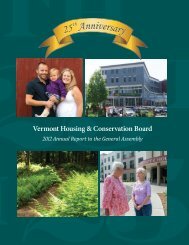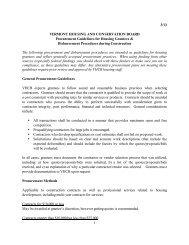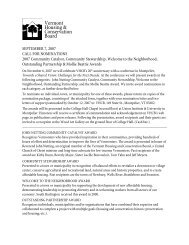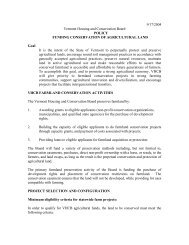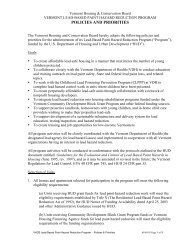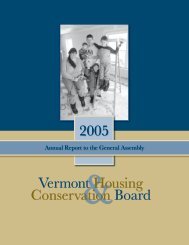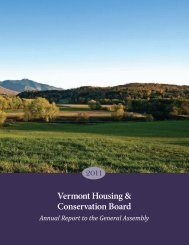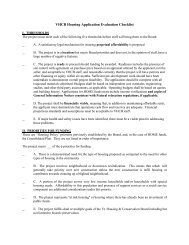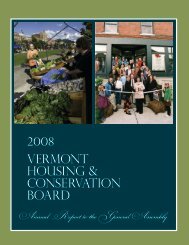2 - Vermont Housing and Conservation Board
2 - Vermont Housing and Conservation Board
2 - Vermont Housing and Conservation Board
Create successful ePaper yourself
Turn your PDF publications into a flip-book with our unique Google optimized e-Paper software.
<strong>Vermont</strong> Farm<br />
Viability Program<br />
2011 Annual Report
2011 <strong>Vermont</strong> Farm Viability Program Advisory <strong>Board</strong><br />
Chuck Ross (Chair), Secretary, <strong>Vermont</strong> Agency of Agriculture, Food <strong>and</strong> Markets<br />
Gary Braman, Loan Officer, USDA Farm Service Agency<br />
Rusty Forgues, Addison farmer, The Rusty John Farm<br />
Alex Ibey, Economic Development Specialist, <strong>Vermont</strong> Department of Economic Development<br />
Sarah Isham, Senior Agricultural Loan Officer, <strong>Vermont</strong> Economic Development Authority<br />
Douglas Lantagne, Dean, UVM Extension<br />
Hannah Noel, Highgate farmer, Maplewood Natural Organics<br />
Earl Ransom, Strafford farmer, Rock Bottom Farm & Strafford Creamery<br />
Bill Suhr, Shoreham apple grower, Champlain Orchards<br />
Gus Seelig, Executive Director, <strong>Vermont</strong> <strong>Housing</strong> & <strong>Conservation</strong> <strong>Board</strong><br />
<strong>Vermont</strong> Farm Viability Program<br />
<strong>Vermont</strong> <strong>Housing</strong> & <strong>Conservation</strong> <strong>Board</strong><br />
58 East State Street, Montpelier, VT 05602<br />
Ela Chapin, Program Director<br />
802 828 2117 | ela@vhcb.org<br />
Liz Gleason, Program Assistant<br />
802 828 3370 | liz@vhcb.org<br />
www.vhcb.org/viability.html<br />
Front cover photos, top to bottom: Beth Kennet <strong>and</strong> son at Liberty Hill Farm, Rochester;<br />
Bread <strong>and</strong> Roses farmst<strong>and</strong> at farmers market; David Fried at Elmore Roots Nursery;<br />
sheep at Maple Wind Farm, Huntington; Mimi Arnstein at her farm st<strong>and</strong> in Marshfield;<br />
Back cover photos, top to bottom: Tyler <strong>and</strong> Melanie Webb of Stony Pond Farm in Fairfield<br />
at the Burlington Farmers Market; James Bove of Chapin Orchard in Essex; greenhouse at<br />
Jericho Settlers Farm; Ray Shatney <strong>and</strong> Janet Steward at Greenfield Highl<strong>and</strong> Beef Farm<br />
(Plainfield <strong>and</strong> Greensboro); Jim Choiniere, Bristol & Addison farmer<br />
This report is made by the Secretary of the <strong>Vermont</strong> Agency of Agriculture,<br />
Food <strong>and</strong> Markets, in collaboration with the <strong>Vermont</strong> <strong>Housing</strong> &<br />
<strong>Conservation</strong> <strong>Board</strong>, pursuant to 6 V.S.A. § 4710(f)
<strong>Vermont</strong> Farm Viability Program<br />
Dear Members of the General Assembly:<br />
January 31, 2012<br />
We are pleased to present this annual report for the <strong>Vermont</strong> Farm Viability Program. Since 2003, the<br />
program has offered on-farm business planning, financial <strong>and</strong> technical assistance services to 336 farmers.<br />
Since 2009, the program has supported 49 agriculture-related businesses with financial <strong>and</strong> technical<br />
services, enhancing the development of <strong>Vermont</strong>’s processing <strong>and</strong> distribution infrastructure. Ag-related<br />
grants <strong>and</strong> technical assistance awards have increased capacity at slaughterhouses <strong>and</strong> meat processing<br />
facilities, exp<strong>and</strong>ed food-grade grain processing facilities, <strong>and</strong> supported the expansion of businesses aggregating<br />
<strong>and</strong> marketing <strong>Vermont</strong>-grown vegetables, meats, cheeses <strong>and</strong> other products.<br />
· In 2011, 40 farms were enrolled <strong>and</strong> 21 farms <strong>and</strong> 10 ag-related businesses received matching grants to<br />
exp<strong>and</strong> or build new infrastructure, improve farm facilities, or start new value-added enterprises<br />
· Since 2005, the program has awarded 99 grants totalling $405,000, leveraging more than $1.1 million<br />
in farm investments through loans, other grants <strong>and</strong> private funds.<br />
· 95-100% of participating farmers report improvement in their financial analysis skills <strong>and</strong> business<br />
planning skills.<br />
This has been an exciting year during which, with support from the <strong>Vermont</strong> Ag Innovation Center, we<br />
added business planning <strong>and</strong> technical assistance offerings to meet the needs of farm businesses wishing<br />
to scale up their meat <strong>and</strong> vegetable production, helping to meet increasing <strong>and</strong> often year-round dem<strong>and</strong><br />
from processors, restaurants <strong>and</strong> retail outlets. Also with AIC funds we have partnered with the <strong>Vermont</strong><br />
Food Venture Center <strong>and</strong> NOFA-<strong>Vermont</strong> staff to deliver exp<strong>and</strong>ed, one-on-one technical assistance to<br />
farm <strong>and</strong> food businesses throughout the state.<br />
We wish to thank the USDA Natural Resources <strong>Conservation</strong> Service for identifying funding for the<br />
<strong>Vermont</strong> Farm Viability Program in 2012. NRCS funds secured by Senator Leahy since 2005 have matched<br />
state funding provided by VHCB, paying for program services <strong>and</strong> administration. Funding from USDA<br />
Rural Development, the Castanea Foundation <strong>and</strong> the John Merck Fund is instrumental to the Implementation<br />
Grants Program.<br />
The Farm to Plate Strategic Plan <strong>and</strong> the Working L<strong>and</strong>s Enterprise Investment Bill lay out a comprehensive<br />
agenda for <strong>Vermont</strong> agriculture. The <strong>Vermont</strong> Farm Viability Program will play a role in the<br />
implementation of these efforts, as we continue to assist farmers <strong>and</strong> ag-related businesses to strengthen<br />
<strong>and</strong> exp<strong>and</strong> their operations, increasing the production of food, fiber <strong>and</strong> fuel products to meet the growing<br />
dem<strong>and</strong> both in-state <strong>and</strong> beyond.<br />
We look forward to another year serving <strong>Vermont</strong>’s agricultural businesses. Please call us with any questions<br />
you may have.<br />
Sincerely,<br />
Chuck Ross, Secretary<br />
Gustave Seelig, Executive Director<br />
58 East State Street | Montpelier, VT 05602 | 802 828 2117 | www.vhcb.org/viability.html<br />
A program of the <strong>Vermont</strong> <strong>Housing</strong> & <strong>Conservation</strong> <strong>Board</strong> established<br />
in collaboration with the <strong>Vermont</strong> Agency of Agriculture, Food & Markets
vermont farm viability program<br />
PROGRAM MISSION<br />
The <strong>Vermont</strong> Farm Viability Program (VFVP)<br />
strives to enhance the financial success <strong>and</strong> long-term<br />
viability of <strong>Vermont</strong> agriculture. The VFVP provides<br />
financial <strong>and</strong> technical services to eligible <strong>Vermont</strong><br />
farmers <strong>and</strong> agriculturally-related businesses. The program<br />
emphasizes the development of sound business<br />
plans in conjunction with technical advice from an individual<br />
or team of advisors, selected to match each<br />
individual farmer’s or business’ needs.<br />
Assisting Farm Businesses<br />
During the approximately year-long process that<br />
culminates with the completion of a written business<br />
plan, the Program offers business planning assistance<br />
which includes in-depth financial analysis, analyzing<br />
marketing strategies, developing goals, <strong>and</strong> creating a<br />
plan to meet goals. Once business plans are complete,<br />
the VFVP offers further assistance in monitoring <strong>and</strong><br />
implementing the goals of the business plan, including<br />
grants for capital projects when funding is available.<br />
During the implementation phase, participants may be<br />
referred to financing services, grant sources, or other<br />
programs that may be of assistance in meeting business<br />
plan goals. The Program enrolls between 35-50 farms<br />
each year.<br />
Assisting Value-Added<br />
Food <strong>and</strong> Farm Businesses:<br />
Developing <strong>Vermont</strong>’s Processing,<br />
Storage <strong>and</strong> Distribution Infrastructure<br />
With funding from the USDA Rural Development<br />
<strong>and</strong> the <strong>Vermont</strong> Agricultural Innovation Center<br />
in 2011, the VFVP provided business planning<br />
<strong>and</strong> technical assistance services to farms producing<br />
value-added products <strong>and</strong> to value-added food businesses<br />
that provide processing, storage or distribution<br />
services to, or purchase products from, <strong>Vermont</strong><br />
farmers. In addition, with private foundation funding,<br />
the VFVP offered grants for capital expenses related<br />
to infrastructure development to these same kinds of<br />
businesses.<br />
Since 2003, 336 farmers have completed business<br />
plans through VFVP. These businesses<br />
own or rent over 105,000 acres <strong>and</strong> provide the<br />
equivalent of over 1,100 full-time jobs.<br />
2011 highlights:<br />
• 40 farms developed business plans<br />
• 44 farms received follow-up planning <strong>and</strong><br />
technical assistance<br />
• 15 farms received technical assistance<br />
awards<br />
• 21 farms were awarded implementation<br />
grants<br />
• 23 ag-related businesses received business<br />
planning services or grants<br />
ENROLLED FARMS<br />
• 13 percent are dairy farms<br />
• 28 percent produce vegetables<br />
• 87 percent raise meat or livestock<br />
• 23 percent are conserved<br />
• 28 percent are certified organic<br />
• 35 percent sell value-added products<br />
“The Farm Viability Program is making<br />
a real difference for farmers across<br />
the spectrum—from dairy to beef to<br />
vegetable farms <strong>and</strong> for value-added<br />
producers like cheese makers—this<br />
program is giving farmers the benefit<br />
of an inside look at business planning<br />
decisions that can increase profits.<br />
As a result, farms are exp<strong>and</strong>ing,<br />
diversifying, <strong>and</strong> hiring help—all good<br />
indicators for the industry <strong>and</strong> for<br />
<strong>Vermont</strong>’s economy.”<br />
— Secretary Chuck Ross<br />
Agency of Agriculture, Food & Markets<br />
2
Program Partners<br />
Business planning <strong>and</strong> technical assistance<br />
services are delivered on the farm or site of business,<br />
<strong>and</strong> are provided by contractors or by the<br />
following organizations as a part of the <strong>Vermont</strong><br />
Farm Viability Program Network:<br />
UVM Extension provides a range of services to<br />
farmers, including Farm Viability programming.<br />
Extension Farm Viability staff are spread throughout<br />
the state <strong>and</strong> cover a wide variety of expertise,<br />
from conventional dairy to diversified farms. The<br />
UVM Extension Farm Viability Programs pair<br />
farmers with an adviser, working together to catalog<br />
assets, create a plan, incorporate ideas for new<br />
business ventures, <strong>and</strong> access financing.<br />
The Intervale Center provides farm viability<br />
assistance through their Success on Farms<br />
Program. They utilize skilled staff, business consultants<br />
<strong>and</strong> veteran growers to develop business<br />
plans with a diversity of farmers, including vegetable<br />
<strong>and</strong> fruit growers, dairy farms, livestock<br />
producers, <strong>and</strong> value-added producers. The program<br />
works to enhance not just the profitability<br />
of farms <strong>and</strong> value-added agricultural businesses,<br />
but also their social <strong>and</strong> environmental sustainability.<br />
NOFA-VT has been providing technical assistance<br />
to dairy, livestock, <strong>and</strong> fruit & vegetable<br />
producers since 1994, adding fruits, grains, <strong>and</strong><br />
seeds along the way. With funding from VHCB,<br />
they exp<strong>and</strong>ed to add business planning services<br />
in 2003. NOFA works with organic producers,<br />
other producers interested in transitioning to<br />
organic, farmers exploring alternative energy or<br />
energy efficiency systems, <strong>and</strong> farmers pursuing<br />
value-added products.<br />
L<strong>and</strong> For Good offers education <strong>and</strong> assistance<br />
to owners <strong>and</strong> managers of working l<strong>and</strong>s, entering<br />
farmers, <strong>and</strong> other-l<strong>and</strong> use decision-makers<br />
throughout New Engl<strong>and</strong>. LFG joins the Farm<br />
Viability Network in 2012 to provide specialized<br />
transfer planning expertise.<br />
Cheryl <strong>and</strong> JD DeVos, Ferrisburgh & Charlotte<br />
After conserving their farm in 2004, Cheryl <strong>and</strong> JD<br />
DeVos transitioned to organic with help from NOFA-<br />
VT provided through the Farm Viability Program. In<br />
2009, they reapplied to VFVP, this time to plan for a<br />
value-added organic milk bottling facility. A 2010<br />
Farm Viability implementation grant will help them<br />
purchase equipment for the new enterprise: Green<br />
Mountain Organic Creamery, due to open in 2012.<br />
Chris Siegriest, Westford<br />
At Bread <strong>and</strong> Roses Farm, Westford native Chris<br />
Siegriest grows vegetables under the community<br />
supported agriculture (CSA) model. The business<br />
has grown to offer 70 full-sized shares <strong>and</strong> pursues<br />
a social mission as well: producing vegetables to<br />
fill 50 smaller shares for residents at a local senior<br />
housing development at a subsidized price. Chris<br />
completed a business plan with the Farm Viability<br />
Program in 2010, working with staff at the Intervale<br />
Center to focus on financial analysis.<br />
3
Ben Gleason, Bridport<br />
Bridport farmers Ben <strong>and</strong> Theresa Gleason<br />
have become well-known across New Engl<strong>and</strong> for<br />
their organic grain-growing expertise. Ben grows<br />
around 40 acres of his own wheat each year to mill in<br />
his facility <strong>and</strong> has recently begun contracting with<br />
nearby farmers to grow wheat for the business.<br />
In 2009, Ben milled a record crop of wheat—35<br />
tons. This dramatic increase in production led Ben to<br />
write a business plan <strong>and</strong> apply for an agricultural<br />
infrastructure grant from VFVP. The grant allowed<br />
him to double the footprint of his millhouse <strong>and</strong> install<br />
an additional mill <strong>and</strong> sifting equipment. The<br />
increased capacity of the mill, coupled with the contracts<br />
from other farmers to grow wheat for him, has<br />
exp<strong>and</strong>ed production to almost 140 tons of wheat<br />
per year—a 400% increase.<br />
The Middlebury Co-op has been purchasing Ben’s<br />
flour for almost fifteen years. In fact, Gleason Grains<br />
whole wheat flour is the only bulk whole wheat flour<br />
sold at the co-op. Says bulk foods manager Reiner<br />
Winkler, “The whole wheat flour has been a huge<br />
seller all along <strong>and</strong> it is a very good price…anyone<br />
who discovers his flour becomes very fond of it!”<br />
Program Evaluation <strong>and</strong> Impacts<br />
Program participants evaluate the program after<br />
their business plan is complete, <strong>and</strong> at the end of their<br />
second year, following additional work with their advisor<br />
to update <strong>and</strong> implement their business plan.<br />
For farmers that completed plans in 2010, average<br />
gross income increased 38% (over $12,000) in the year<br />
after completing their business plan. For farmers enrolled<br />
in 2010, 97-100% report their financial analysis<br />
skills <strong>and</strong> business planning skills have improved since<br />
enrolling in the program.<br />
Farmers interviewed after their first or second<br />
year of the program said satisfaction with their overall<br />
business management ability rose from 31% before<br />
the program to 88% afterwards. Satisfaction with their<br />
ability to generate income rose from 31% to 69%, <strong>and</strong><br />
their ability to underst<strong>and</strong> the direction they would<br />
like the business to take increased from 28% to 84%.<br />
Farmers <strong>and</strong> ag-related businesses that receive a<br />
grant also complete an in-depth survey after their<br />
project is complete. Survey results show that the implementation<br />
grants program helps farm <strong>and</strong> ag-related<br />
businesses implement business plan goals, increase<br />
profits, improve access to financing, <strong>and</strong> create new<br />
jobs, while leveraging the investment of other funding<br />
sources for these improvements:<br />
• 89% of phone survey respondents said that without<br />
grant funding, the project either would never have<br />
happened, happened later, or happened at a much<br />
slower rate.<br />
• 92% of phone survey respondents stated that the<br />
implementation grant contributed to making their<br />
business more profitable.<br />
• Eleven phone respondents offered additional details<br />
on job creation, reporting at least 35 FTE positions<br />
were created on these eleven farms, an increase of<br />
3.2 FTE jobs per business!<br />
Irene Recovery Efforts<br />
In the wake of Tropical Storm Irene, the VFVP redirected<br />
$60,000 to UVM Extension for disaster<br />
recovery planning to affected farms. Eighty farms were<br />
contacted. Half reported damages <strong>and</strong> received shortterm<br />
recovery assistance. Six severely damaged farms<br />
are working on disaster recovery plans with UVM advisors.<br />
4
Farm Viability staff convened two meetings in<br />
2011 to address the coordination of recovery-related<br />
technical assistance in the wake of Tropical Storm<br />
Irene. Meeting in September <strong>and</strong> November, with a<br />
third meeting scheduled for this March, federal, state<br />
<strong>and</strong> regional ag development leaders met to share information,<br />
resources, <strong>and</strong> identify gaps in technical<br />
assistance to the farm community. Outcomes of these<br />
meetings to date have included new partnerships; collaborations<br />
in outreach to recovering farm businesses;<br />
the identification of particular issues that the VAAFM,<br />
State Legislature or other authorities may need to address;<br />
<strong>and</strong> improved awareness among farm service<br />
providers of various resources available to farmers.<br />
Professional Development for<br />
the VT Farm Viability Network<br />
Each year the FarmViability Program provides<br />
significant professional development opportunities<br />
to farm <strong>and</strong> food business advisors,<br />
at regular meetings of the <strong>Vermont</strong> Farm Viability<br />
Network as well as at occasional special<br />
trainings or conferences. In 2011, the following<br />
trainings sessions were provided for farm<br />
service providers <strong>and</strong> consultants:<br />
• Food Safety: Training on GAPs requirements<br />
for small farms<br />
• Food Safety: Presentation by new UVM<br />
Extension food safety specialist Londa<br />
Nwadike<br />
• Disaster Recovery Resources: presentation,<br />
roundtable, <strong>and</strong> coordination discussion<br />
• Technical Assistance: Panel presentations<br />
from various technical assistance consultants<br />
• Technical Assistance: Updates on the <strong>Vermont</strong><br />
Ag Development Program<br />
• Management Analysis: clarifying management<br />
roles <strong>and</strong> decision-making strategies<br />
• Financial Analysis: Financial Planning<br />
Tricks <strong>and</strong> Tools<br />
“This grant will not only benefit<br />
my business, but also many<br />
other small scale farms in <strong>Vermont</strong>.”<br />
— Clark Parmelee<br />
Clark Parmelee, a 2010 VTC Dairy Management<br />
graduate, began working on dairy farms<br />
in the R<strong>and</strong>olph area at the age of 13 <strong>and</strong> has<br />
been actively involved in agriculture ever since.<br />
During his time at VTC, Clark began raising<br />
broilers, pork, <strong>and</strong> beef on his parent’s farm. His<br />
goal is to scale up production in order to create<br />
a viable, diversified farm providing full-time<br />
employment.<br />
Clark began helping neighbors to slaughter<br />
their chickens in 2010 <strong>and</strong> quickly realized there<br />
was high dem<strong>and</strong> for small-scale poultry processing<br />
in the R<strong>and</strong>olph area. He used a $5,000<br />
Farm Viability Ag Business grant to purchase a<br />
mobile poultry processing unit. Clark worked<br />
closely with the meat inspector at the Agency of<br />
Agriculture <strong>and</strong> the UVM Extension food safety<br />
specialist to ensure that the operation would be<br />
clean <strong>and</strong> safe.<br />
By mid-September, Clark had processed poultry<br />
for at least 25 small-scale producers, mostly<br />
in the R<strong>and</strong>olph area. Clark plans to begin marketing<br />
in 2012 to slowly scale up operation of<br />
the mobile unit.<br />
5
Pete Colman, <strong>Vermont</strong> Salumi<br />
Leaders in <strong>Vermont</strong>’s food system have exciting<br />
things to say about artisanal cured meats <strong>and</strong> Rowan<br />
Jacobsen of <strong>Vermont</strong> Public Radio believes that “Salumi<br />
(aka charcuterie or cured meats) is the obvious<br />
next frontier in <strong>Vermont</strong>’s food revolution.”<br />
Pete Colman (at left, below, with his right-h<strong>and</strong>man<br />
Sumner Crowel) plans that his new business,<br />
<strong>Vermont</strong> Salumi, will fill this niche. <strong>Vermont</strong> Salumi<br />
was launched in January of 2011, informed by Pete’s<br />
five years of making prosciutto as a hobby—a skill<br />
learned from time spent in Italy with his father’s family<br />
<strong>and</strong> friends. When he began looking into opening<br />
“The business planning process helps you<br />
take a really good look at your business <strong>and</strong><br />
gives you an idea of things to come. With<br />
a solid plan <strong>and</strong> reasonable requests for<br />
funding I have not had trouble accessing<br />
capital.” — Pete Colman<br />
a business making only cured meats, though, he<br />
found that the regulatory requirements to sell dryaged<br />
meat <strong>and</strong> the turn-around time of the product<br />
(it can take several months to a year or more for<br />
cured meats to be ready) were prohibitive.<br />
With the help of a business planner from the<br />
<strong>Vermont</strong> Farm Viability Program, Pete was able to<br />
examine the costs <strong>and</strong> benefits of a cured meat business<br />
<strong>and</strong> create a plan for getting there.<br />
Farm to Plate<br />
Strategic Plan Implementation<br />
The Farm to Plate plan lays out ambitious goals for<br />
<strong>Vermont</strong>’s food system over the coming 10 years, <strong>and</strong><br />
has established a critical new piece of infrastructure,<br />
the Farm to Plate Network. VFVP Director Ela Chapin<br />
will play a role in the development of this new network<br />
as the first chair of the Farm to Plate Technical Assistance<br />
Working Group, <strong>and</strong> as a member of the Farm<br />
to Plate Network steering committee. The VFVP will<br />
play a role in implementing key objectives relative to<br />
the goals <strong>and</strong> strategies of the Farm to Plate Strategic<br />
Plan, including:<br />
• Training for scaling up: Provide specialized<br />
scaling-up technical assistance <strong>and</strong> business planning<br />
services for farmers <strong>and</strong> value-added food<br />
entrepreneurs seeking to serve larger markets;<br />
• Support infrastructure improvements at<br />
slaughter <strong>and</strong> meat processing facilities. Increase<br />
custom <strong>and</strong> mobile slaughter capacity;<br />
• Improve producers’ ability to access retail<br />
market outlets that require GAP or<br />
other forms of food safety certification;<br />
• Increase the number of farmers participating<br />
in technical assistance <strong>and</strong> business planning<br />
services, especially related to diversification strategies,<br />
farm transfers, <strong>and</strong> retirement planning;<br />
• Increase local egg production to meet<br />
50% of local dem<strong>and</strong> by 2020;<br />
• Double in-state goat milk production to<br />
serve the value-added cheese industry.<br />
Funding<br />
The Farm Viability Program is funded by a combination<br />
of state, federal, <strong>and</strong> private sources. State of<br />
<strong>Vermont</strong> funds through VHCB <strong>and</strong> federal sources<br />
from USDA Natural Resource <strong>Conservation</strong> Service,<br />
USDA Rural Development, <strong>and</strong> the <strong>Vermont</strong> Agriculture<br />
Innovation Center fund business planning <strong>and</strong><br />
technical assistance services for farmers <strong>and</strong> ag-related<br />
businesses. In 2011, the Farm Viability implementation<br />
grants program was supported with generous private<br />
foundation funds from the Castanea Foundation <strong>and</strong><br />
the John Merck Fund.<br />
6
Jeremy <strong>and</strong> Leslie<br />
Michaud <strong>and</strong> family<br />
with Agriculture<br />
Secretary Chuck Ross<br />
Kingdom Creamery Churns Out Yogurt & Ice Cream:<br />
Now one of the largest family-operated dairy processors in New Engl<strong>and</strong><br />
The Michaud family has operated Clair-A-Den<br />
Farm in East Hardwick for over seventy years. Three<br />
generations have grown <strong>and</strong> diversified the farm<br />
to its current size of 700 acres, with just over 1,000<br />
cows, a 6,000-tap sugaring operation, <strong>and</strong> an on-farm<br />
composting business. The Michaud family has continuously<br />
pursued new ideas to exp<strong>and</strong> their farm’s<br />
horizons in order to ensure the long-term profitability<br />
of their farm for future generations.<br />
Though the family had already exp<strong>and</strong>ed <strong>and</strong> diversified<br />
their business, Jeremy <strong>and</strong> Leslie Michaud<br />
felt that to continue to succeed in the face of fluctuating<br />
milk prices they needed to diversify their<br />
core milk business. When the nearby <strong>Vermont</strong> Milk<br />
Company went on the market in 2009, Jeremy <strong>and</strong><br />
Leslie jumped at the opportunity. They turned to the<br />
<strong>Vermont</strong> Farm Viability Program to write a business<br />
plan that would evaluate the market dem<strong>and</strong> <strong>and</strong><br />
feasibility of a creamery <strong>and</strong> help secure financing<br />
to start Kingdom Creamery of <strong>Vermont</strong>, a valueadded<br />
yogurt <strong>and</strong> ice cream facility using milk from<br />
Clair-A-Den Farm.<br />
Jeremy <strong>and</strong> Leslie worked closely with Rosalie<br />
Wilson, a business advisor in the Farm Viability<br />
network who specializes in sales <strong>and</strong> marketing, to<br />
develop the plan <strong>and</strong> secure a loan to start the pro-<br />
cessing facility. After completing market research,<br />
they realized a niche for several products made on<br />
a mid-sized scale: soft-serve mix, <strong>Vermont</strong>-made<br />
premium ice cream, <strong>and</strong> <strong>Vermont</strong>-made yogurt. The<br />
Creamery opened in October of 2011 <strong>and</strong> is selling<br />
product in more than 50 stores across <strong>Vermont</strong>. Operating<br />
the processing facility allows the Michauds<br />
to return a higher milk price to the farm than selling<br />
in bulk, which increases <strong>and</strong> stabilizes income<br />
for the farm, <strong>and</strong> the Creamery has hired three additional<br />
employees since its inception.<br />
“<br />
The Farm Viability Program<br />
<strong>and</strong> the consultant helped<br />
take a wild idea <strong>and</strong> bring<br />
it to earth, give it substance <strong>and</strong> turn<br />
it into a reality. Kingdom Creamery<br />
of <strong>Vermont</strong> could not have been<br />
accomplished as effectively on our<br />
own.” — Leslie Michaud<br />
7
2011 Agricultural<br />
Infrastructure Grants<br />
• $9,250 grant to <strong>Vermont</strong> Salumi for sausage<br />
<strong>and</strong> cured meat processing equipment to increase<br />
production level<br />
• $5,825 grant Putney Mountain Winery for<br />
sparkling cider production equipment to increase<br />
efficiency of cider production<br />
“The Farm Viability Program helped us<br />
get a h<strong>and</strong>le on the finances of the project,<br />
<strong>and</strong> the grant funding for equipment<br />
purchase made our regional product<br />
launch a reality. We are thrilled that VT<br />
Goldburgers are now available in 15<br />
natural food co-ops in <strong>Vermont</strong>, New<br />
York <strong>and</strong> Massachusetts. Thanks to this<br />
program we are utilizing thous<strong>and</strong>s of<br />
pounds of organic VT grown produce <strong>and</strong><br />
supporting our farm with year-round<br />
income.” — Oliver Levis<br />
Earth Sky Time Farm, Manchester<br />
On their farm along Route 7A in Manchester, Bonnie<br />
<strong>and</strong> Oliver Levis grow vegetables <strong>and</strong> orchard<br />
fruits <strong>and</strong> operate a licensed commercial kitchen.<br />
They market their products through their farmst<strong>and</strong>,<br />
CSA, <strong>and</strong> <strong>Vermont</strong> co-ops.<br />
In 2009, they enrolled in the Farm Viability Program,<br />
working with consultant Mike Ghia at UVM Extension.<br />
The business planning process helped them<br />
to organize their financial systems <strong>and</strong> record-keeping.<br />
In 2011, Oliver <strong>and</strong> Bonnie received an implementation<br />
grant of $6,700 towards the building <strong>and</strong><br />
outfitting of their farmst<strong>and</strong> <strong>and</strong> to exp<strong>and</strong> production<br />
of their veggie burgers, <strong>Vermont</strong> Goldburgers,<br />
by purchasing a robot coupe mixer, a large woodfired<br />
oven, <strong>and</strong> renovating their commercial kitchen<br />
bakery.<br />
• $16,250 grant to <strong>Vermont</strong> Refrigerated Storage<br />
for a digital inventory management <strong>and</strong><br />
accounting system benefiting farmers selling<br />
to large markets who are in need of tracking<br />
for food safety plans.<br />
• $10,000 grant to The Royal Butcher for excavation,<br />
foundation, <strong>and</strong> plumbing for a<br />
slaughterhouse addition to increase efficiency<br />
<strong>and</strong> throughput of this critical facility.<br />
• $10,995 grant to Westminster Meats to purchase<br />
a vacuum packing machine to increase<br />
meat <strong>and</strong> poultry processing efficiency.<br />
• $10,000 grant to the Mad River Food Hub to<br />
support the purchase of equipment to outfit<br />
their meat processing room <strong>and</strong> commercial<br />
kitchen.<br />
• $5,000 grant to Clark Parmelee of Parmelee<br />
Farm to purchase a mobile custom poultry<br />
processing unit to provide slaughter services<br />
to producers raising fewer than 1,000 meat<br />
birds per year.<br />
• $2,300 grant to Sharon Beef to purchase a<br />
thermal printer to add value to the end product<br />
for their clients as well as improve plant<br />
efficiencies.<br />
• $10,000 grant to Grow Compost to help implement<br />
an Aerated Static Pile Management<br />
system to increase the efficiency of their operation<br />
<strong>and</strong> improve product quality.<br />
• $8,900 grant to Holton Farms towards construction<br />
of a cold-storage unit for more<br />
effective <strong>and</strong> safer crop storage, <strong>and</strong> a commercial<br />
kitchen to process products from their<br />
farm as well as others for inclusion in their<br />
CSA.<br />
6
Implementation Grants to Farmers<br />
Following completion of a business plan, farmers<br />
enrolled in the Farm Viability Program become eligible<br />
for implementation assistance in order to put their<br />
business plan into practice. Since 2005, the program<br />
has awarded 99 implementation grants for capital projects<br />
totaling $405,000 <strong>and</strong> 88 implementation awards<br />
for technical assistance. This $405,000 in grant funds<br />
has leveraged approximately $1,178,074 more in farm<br />
investments through loans, other grants <strong>and</strong> private<br />
funds. In 2011, VFVP awarded 21 farms with implementation<br />
grants totaling $95,000 <strong>and</strong> 15 farms with<br />
technical assistance awards totaling $40,050.<br />
Agricultural Infrastructure Grants<br />
In 2009, in partnership with the Castanea Foundation,<br />
the program began making awards for business<br />
plan implementation grants to agriculture-related<br />
businesses involved in the processing, marketing or<br />
distribution of local food. In 2009, four awards were<br />
made to meat processing businesses totaling $40,000.<br />
In 2010, awards targeted the grain processing industry<br />
as well as meat <strong>and</strong> poultry processing, <strong>and</strong> five awards<br />
were made totaling $65,000. In 2011, ten awards totaling<br />
$88,520 were made. In the three years this<br />
assistance has been available, $193,520 in awards to<br />
processors has leveraged an additional $600,000.<br />
Looking Ahead to 2012:<br />
Need & Dem<strong>and</strong><br />
Dem<strong>and</strong> for business planning, implementation<br />
technical assistance <strong>and</strong> implementation grants<br />
continues to surpass the VFVP’s capacity. There is a<br />
growing interest in the program from farms transitioning<br />
in ownership or farm type, beginning farmers,<br />
<strong>and</strong> in farms pursuing value-added products, as well as<br />
a high dem<strong>and</strong> for assistance <strong>and</strong> grants for infrastructure<br />
improvements in the value-added food sector as<br />
well as on farms. The VFVP will strive to meet that<br />
need in 2012.<br />
In the coming year, the VFVP will continue to partner<br />
with the <strong>Vermont</strong> Sustainable Jobs Fund to enroll<br />
businesses in the <strong>Vermont</strong> Agricultural Development<br />
Program <strong>and</strong>, through funding from the Ag Innovation<br />
Center, will collaborate with NOFA-VT, the University<br />
of <strong>Vermont</strong> <strong>and</strong> the Intervale Center to increase meat<br />
production <strong>and</strong> processing capacity in the state by<br />
providing technical assistance <strong>and</strong> feasibility analysis<br />
to new <strong>and</strong> existing enterprises, <strong>and</strong> sponsoring trainings<br />
that bring together <strong>Vermont</strong> meat producers <strong>and</strong><br />
processors.<br />
“The Farm Viability Program helped our<br />
business on several levels. We were able to<br />
develop a website that helped significantly<br />
improve our marketing operations, a<br />
business plan that helped underpin<br />
a new tractor purchase <strong>and</strong> several<br />
enterprise expansions, <strong>and</strong> improve<br />
our bookkeeping, database, <strong>and</strong> human<br />
resource management.”<br />
— Andy Jones<br />
Intervale Community Farm<br />
Sitting on the s<strong>and</strong>y soils of the Champlain Valley,<br />
the Intervale Community Farm is in its 21st year—<br />
a feat that couldn’t have been achieved without the<br />
spunk <strong>and</strong> determination of farm manager Andy<br />
Jones. In 2008, the farm faced a critical junction <strong>and</strong><br />
sought out the <strong>Vermont</strong> Farm Viability Program for<br />
in depth, one-on-one planning. In order to preserve<br />
the relationship the farm had built with the community,<br />
the business planning process helped to usher<br />
in a cooperative system with the farm’s customers.<br />
9
<strong>Vermont</strong> Farm Viability Program<br />
<strong>Vermont</strong> <strong>Housing</strong> & <strong>Conservation</strong> <strong>Board</strong><br />
58 East State Street, Montpelier, VT 05602<br />
www.vhcb.org/viability.html<br />
802 828 2117<br />
10



